| Srl | Item |
| 1 |
ID:
087309
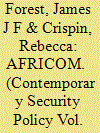

|
|
|
|
|
| Publication |
2009.
|
| Summary/Abstract |
Officially activated on 1 October 2008, US Africa Command (AFRICOM) is first and foremost an internal consolidation and reorganization of Defense Department personnel. Its primary mission is to help Africans address their security challenges. AFRICOMdiffers from other Defense Department organizations by focusing primarily on activities that contribute not to warfighting, but war prevention. Even so, it has struggled with controversy since its inception. The views of key constituencies range from lukewarm acceptance to outright hostility. The central lesson from this research is that the views of foreign audiences toward American foreign policies have a direct impact on the success of those policies. One of its most difficult tasks will be convincing key audiences - African governments and militaries, NGOs, international media, and not least other US government agencies and the Congress - that the effort and funding put into this command were worthwhile and should continue. Confusion still remains over exactly what AFRICOM is and what it wants to do. Sorting this out will require consulting, listening, and learning. Its leaders must develop and lead a new type of organization that runs counter to traditional instincts of senior personnel in the Department of Defense who continue to resist the notion of interagency coordination. In sum, we remain hopeful that the past need not predict the future of American policies in Africa.
|
|
|
|
|
|
|
|
|
|
|
|
|
|
|
|
| 2 |
ID:
087320
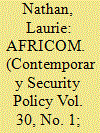

|
|
|
| 3 |
ID:
087322
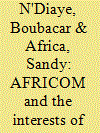

|
|
|
| 4 |
ID:
087314
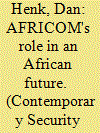

|
|
|
|
|
| Publication |
2009.
|
| Summary/Abstract |
In the recent past America's leaders created a major new military entity the US Africa Command (AFRICOM). In a well researched article,authors James Forest and Rebecca Crispin describe AFRICOM and the motivations for its creation, offeringn an interesting glimpse into the ways America's political leaders see the world and their role in it.
|
|
|
|
|
|
|
|
|
|
|
|
|
|
|
|
| 5 |
ID:
087337
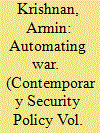

|
|
|
|
|
| Publication |
2009.
|
| Summary/Abstract |
New technological developments in the area of robotics and artificial intelligence have made robotic weapons systems of increasing autonomy possible. Although thousands of unmanned systems have been deployed, the vast majority are unarmed, used primarily for reconnaissance or removal of explosives. But deployment of armed robotic weapons has begun and promises to accelerate rapidly in the next decade. This article begins by proposing definitions of autonomous or robotic weapons, outlines the most important obstacles to their introduction, and options for arms control. It makes three claims: first, robotic weapons such as unmanned vehicles could largely replace human soldiers in the battlespace in one or two decades; second, for technical, economic, and operational reasons robotic weapons will become increasingly autonomous; finally, these new types of conventional weapons could result in new dangers to international security that should be addressed before the weapons are introduced and proliferate widely. It is suggested that an outright ban would be unlikely to be successful and that it may not even be desirable. A ban of particular types of offensive automatic weapons (AW) and special provisions on defensive types would make most sense.
|
|
|
|
|
|
|
|
|
|
|
|
|
|
|
|
| 6 |
ID:
087326


|
|
|
| 7 |
ID:
087312
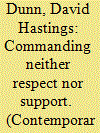

|
|
|
|
|
| Publication |
2009.
|
| Summary/Abstract |
One of the often repeated malapropisms of George W Bush was his claim that he was misunderestimated. A more accurate observation would be that the Bush administration was often misunderstood in its own approach to the outside world.
|
|
|
|
|
|
|
|
|
|
|
|
|
|
|
|
| 8 |
ID:
087319


|
|
|
| 9 |
ID:
087310


|
|
|
|
|
| Publication |
2009.
|
| Summary/Abstract |
The starting point for understanding French reactions to AFRICOM's launch is to appreciate the very different historical significance that the continent has for France and the United States.
|
|
|
|
|
|
|
|
|
|
|
|
|
|
|
|
| 10 |
ID:
087335
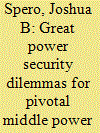

|
|
|
|
|
| Publication |
2009.
|
| Summary/Abstract |
By theoretically and empirically examining regional middle power influence, this article explores how particular middle powers emerge pivotally to affect great powers. Clearly, middle powers like Poland and South Korea cannot act effectively alone. But they are at the centre of greater power disputes and must insulate themselves from great power alignments to preserve independence and prosperity. Even with their frequent predicaments, such as limited resources and modest power capabilities, middle powers can influence great power security dilemmas, and even can reduce those dilemmas through regional and cooperative bridging alignments.
|
|
|
|
|
|
|
|
|
|
|
|
|
|
|
|
| 11 |
ID:
087329


|
|
|
|
|
| Publication |
2009.
|
| Summary/Abstract |
AFRICOM was created in an authoritarian manner without answering the fundamental question is AFRICOM in the American nationa interest. There are fundamental challenges that AFRICOM will struggle to manage, and it seems quite possible that it will have a not-so-promosing future.
|
|
|
|
|
|
|
|
|
|
|
|
|
|
|
|
| 12 |
ID:
087316
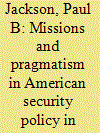

|
|
|
| 13 |
ID:
087317
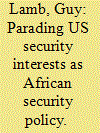

|
|
|
|
|
| Publication |
2009.
|
| Summary/Abstract |
The creastion of US Africa Command is not one of these benevolent rarities. In cruide terms, AFRICOM has been principally created with the aim of enhancing the security of the United States government and its citizens, botha at home and abroad.
|
|
|
|
|
|
|
|
|
|
|
|
|
|
|
|
| 14 |
ID:
087325
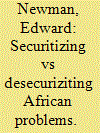

|
|
|
|
|
| Publication |
2009.
|
| Summary/Abstract |
The establishment of AFRICOM does represent a new US strategic focus upon Africa which reflects changing perception of the nature of international threats to security.
|
|
|
|
|
|
|
|
|
|
|
|
|
|
|
|
| 15 |
ID:
087331
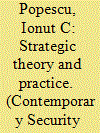

|
|
|
|
|
| Publication |
2009.
|
| Summary/Abstract |
This study argues that the strategic planning process of the Long War on Terror has been conducted in a manner that did not pay sufficient attention to the tenets of classical strategic theory. The article shows that the strategy encapsulated in the National Strategy for Combating Terrorism and the Pentagon's initial responses to the challenges of irregular warfare departed from important principles associated with Clausewitz and other strategic theorists, undermining the prospects for successful counterterrorism. The reasons are partly the fault of the Bush administration, and partly a consequence of the American strategic culture and the preferred model of American civil-military relations. By turning back to strategic fundamentals, important improvements in strategic performance have been accomplished since 2006. The Obama administration can build upon the later successes of its predecessor in Iraq and in reshaping the US armed forces. In addition, the new president can refine and improve the Bush administration's counterterrorism strategy particularly by clarifying short- and long-term political goals. In order for this to happen, the new administration must do a better job of incorporating into its strategic planning main ideas from Clausewitzian strategic thought, such as the necessity for clearly defined political objectives in war and understanding strategy as first and foremost a process of employing military and non-military means in such a way as to achieve those political objectives.
|
|
|
|
|
|
|
|
|
|
|
|
|
|
|
|
| 16 |
ID:
087333


|
|
|
|
|
| Publication |
2009.
|
| Summary/Abstract |
The purpose of this article is to explain why the UK's strategy and operations in the war on terror have so far failed to produce the desired strategic effect. Britain's counterterror strategy has been plagued by a five basic challenges: the nature of the enemy and the emergence new terrorism; the inability of the UK to articulate a coordinated counterterrorist/counterinsurgency strategy; the particular goals adopted to fight this war; and the resource challenges created by these operational and strategic objectives. The central argument is that British national and military strategy is fundamentally flawed because the UK has failed to pay sufficient attention to the basic preconditions required to generate a successful strategy. Because of this failure at the highest political level, the armed forces have faced the challenge of trying to reconcile a profound mismatch between resources and commitments.
|
|
|
|
|
|
|
|
|
|
|
|
|
|
|
|